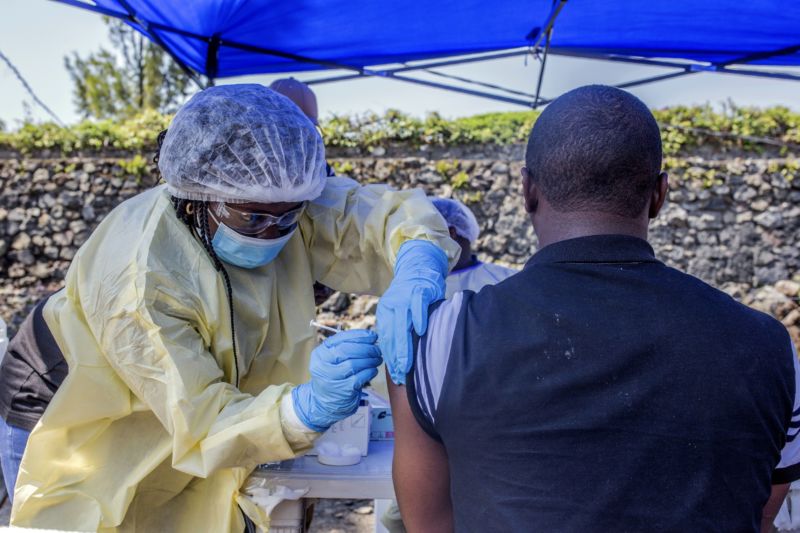
As the world anxiously monitors the outbreak of Ebola in Democratic Republic of the Congo, health officials note that a measles outbreak declared last month in the country has killed more people—mostly children—and faster.
Since January 2019, officials have recorded over 100,000 measles cases in the DRC, mostly in children, and nearly 2,000 have died. The figures surpass those of the latest Ebola outbreak in the country, which has tallied not quite 2,500 cases and 1,665 deaths since August 2018. The totals were noted by World Health Organization Director-General, Tedros Adhanom Ghebreyesus, in a speech today, July 15, at the United Nations Office in Geneva, Switzerland."Frankly, I am embarrassed to talk only about Ebola," Dr. Tedros said (he goes by his first name). He gave the speech in response to two new developments in the Ebola outbreak. That is that two Ebola responders were murdered in their home in the DRC city of Beni and that officials on Sunday had identified the first case of Ebola in Goma, a DRC city of over one million at the border with Rwanda.
"Both of these events encapsulate the challenges we continue to face on a daily basis in DRC," he said. Tedros was referring to the scattering of disease—including Ebola and measles—as violence hampers outbreak responses and access to medical care. Since January, officials have counted 198 attacks on health responders, which left seven dead and 58 healthcare workers and patients injured.
Ebola control
The current Ebola outbreak is the second largest on record (surpassed only by the 2014 West African outbreak that sickened more than 28,000, killing 11,000). WHO experts have expressed "deep concern" about it, noting the risks that it could spread to neighboring countries in the region. Still, they determined on three separate occasions so far that the outbreak does not meet the criteria of a public health emergency of international concern, or PHEIC.
In the latest development, health officials jumped into action when a 46-year-old pastor tested positive for Ebola in the DRC city of Goma. The pastor was on an evangelical mission and had recently traveled from Butembo, which has grappled with the viral disease since last December. While there, the pastor had delivered sermons in seven churches and laid his hands on worshippers, some of whom were ill.Though he began experiencing symptoms while in Butembo, he traveled by bus to Goma on July 12 with 18 other people. The bus passed through three health checkpoints on its way, but the pastor showed no symptoms and gave different names at each checkpoint. This is possibly because he was trying to conceal his identity and health status, officials said.
By the afternoon of the 14th, healthcare workers in Goma confirmed he had Ebola and transferred him to an Ebola treatment center. Officials have since tracked down the other 18 bus passengers. Today, the DRC health ministry decided to send the pastor back to Butembo for further treatment, according to Doctors without Borders.
"Because of the speed with which the patient was identified and isolated, and the identification of all the other bus passengers coming from Butembo, the risk of it spreading in the rest of the city of Goma is small," the ministry said in a statement.
Viral spread
So far, the Ebola outbreak has largely stayed in DRC's North Kivu and Ituri provinces, which sit on the eastern side of the country and border South Sudan, Uganda, and Rwanda. The measles outbreak, on the other hand, has spanned at least 23 of the country's 26 provinces. The health ministry declared an outbreak on June 10 and noted a 700% spike in the case count over the count in the first half of last year.
"And yet it gets little international attention," Dr. Tedro noted, adding that malaria also kills more than 50,000 people each year in the DRC.
Just like with the Ebola outbreak, violence, population movements, and community fear have kept the measles outbreak simmering.
"We often talk about the need to bridge the humanitarian-development nexus," Dr. Tedro said. "This is the moment to practice what we preach. WHO is committed not just to ending this [Ebola] outbreak, but to strengthening DRC's health system... To build trust, we must demonstrate that we are not simply parachuting in to deal with Ebola and then leaving once it's finished."
While health officials face unique challenges to curbing disease in the DRC, the republic is far from the only country to face a boom in measles cases. In 2018, WHO and UNICEF tallied nearly 350,000 measles cases worldwide, a figure more than twice that of 2017. Many countries reported outbreaks, with some of the largest being in Ukraine, the Philippines, and Brazil.So far in 2019, the US is experiencing the largest measles outbreak since 1992. Access to vaccines plays a large role in the rise, as does vaccine refusal. The WHO listed vaccine hesitancy as one of the top ten threats to global health in 2019.
reader comments
92